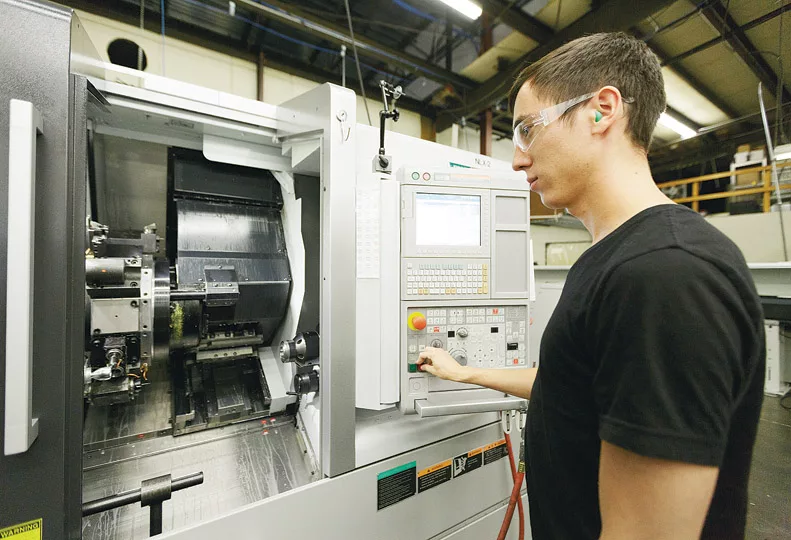Calling all machinists
Improving economy cited as factor in shortage; wages said rising

The demand for machinists in the Spokane area remains high, with a number of companies here advertising openings online.
The U.S. Department of Labor’s Bureau of Labor Statistics predicts continued job opportunities for machinists as older, more experienced workers retire and young people with the right qualifications and education choose to pursue other interests.
“There is a big demand, and employers are having a hard time getting those jobs filled,” says Steven Warren, business representative for International Association of Machinists Spokane. “They’re out there looking for qualified people, but they just can’t seem to find that pool anymore.”
Mary Stanton, an employment and training specialist at WorkSource Spokane, says she knows of several area companies that are looking to hire machinists. Although she hasn’t heard of any offering signing bonuses, she did say that starting wages for new hires have gone up over the last couple of years.
“It used to be that someone just getting out of a tech program could expect around $12 an hour starting pay; now days we’re looking at anywhere from $14 to $18. Some companies may even pay higher than that,” says Stanton.
She says the strong demand for machinists might be due to the improving economy.
“Unemployment is down, and business is up across all spectrums. Manufacturing is doing quite well, with many companies starting to diversify following the recession,” says Stanton.
She confirmed that there are definitely people interested in training to become machinists and fill those waiting positions. “We have no problem getting classes filled. In fact, we have wait lists.”
A machinist uses machine tools to make or modify parts, usually metal parts, in a process known as machining. Machinists use tools to cut away excess material, creating parts that conform to set specifications or tolerances. Modern machinists generally also must have knowledge of computer numerical control (CNC) systems to operate machinery that uses computer technology to create precision parts quickly.
Stan Key, Greater Spokane Incorporated’s manufacturing industry manager, says that the demand for machinists isn’t particularly new to manufacturing communities like Spokane.
“In most communities across the nation that have any amount of manufacturing, there is a need for skilled machinists and welders,” says Key. “I would say there are several companies here that, should an experienced machinist walk through the door, they would likely be hired.”
Krystal Siegfried, human resources manager at Spokane-based MacKay Manufacturing Inc., says that the company is looking to hire skilled machinists probably 99 percent of the time.
“I would agree that recently there has been a demand for qualified machinists in this area. As the economy has picked up, these companies have more work available,” Siegfried says. “Also a lot of talented machinists are retiring and there isn’t anyone to replace the individuals at that level yet.”
She adds, “I suppose I wouldn’t call it demand as much as an increased level of competition. Business is increasing, and it’s harder to find the skilled individuals for this type of work.”
While MacKay Manufacturing, which fabricates components used in the medical, aerospace, semiconductor and other industries, doesn’t currently offer signing bonuses or other incentives for machinists, Siegfried says she’s aware of other companies in the area that do. She says each company’s needs vary according to the parts they make and the machines they use.
“They may be using a machine with several different programs, or one that makes a part with varying dimensions. The machinist needed for a certain job or type of machine may need to be at a more senior level of capability,” she explains.
Siegfried says MacKay works closely with programs at both Spokane Community College and North Idaho College, participating in their intern and co-op programs. “We do typically hire at least some of their grads, who start out in entry-level positions. We’re glad to have them, but many are still years away from being experienced enough to troubleshoot some of our more complex machinery.”
Spokane Community College offers both a machinist/computer numerical control (CNC) technology AAS degree, and a four-quarter machinist/CNC certificate. Adjunct instructor Cal Christian teaches evening courses as part of the machinist/CNC certificate offered to SCC students. He says of the certification program, “It’s a pretty robust skill set we have to teach, and there’s a lot to learn. We’re really just equipping the students with entry-level skills, enough for them to be hired on and then continue expanding their training in the workplace.”
Christian says the programs attract a high level of interest and generally a waiting list to get in. “This last time around, I had six people complete the course. This current class, I have 13 that I expect will complete it.”
While some students drop the courses early on for various reasons, Christian says SCC tries to keep the class sizes to at least 20 students. “I do know the program will be changing soon to allow for the intake of additional students each quarter, should we lose some along the way,” Christian says.
Besides being an instructor, Christian also works as a technical and training development specialist for Wagstaff Inc., another company which often works with students from SCC’s machinist intern programs.
“It is a very popular program both with students and at the company,” he says.
International Association of Machinists Spokane’s Warren says, “Employers are receptive to students just coming out of school, but even some of those students are going elsewhere for jobs. They’re looking at bigger markets in larger cities.”
The SCC’s webpage for the program states that more than 1,000 CNC operators currently are needed in Washington state alone, and that the industry is expected to remain strong beyond the year 2020.
Related Articles
Related Products

_c.webp?t=1763626051)
_web.webp?t=1764835652)

